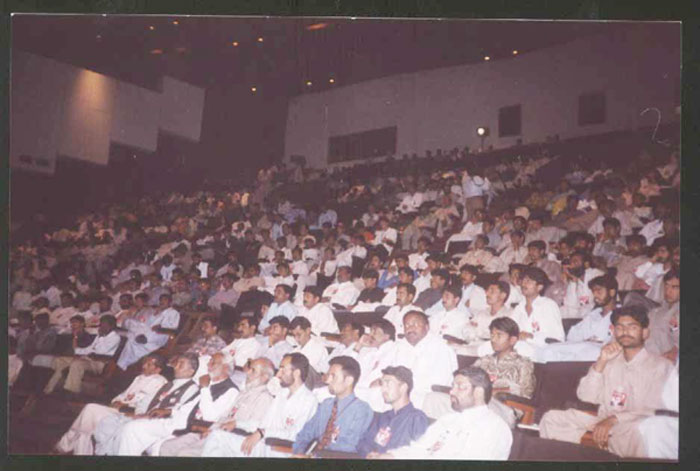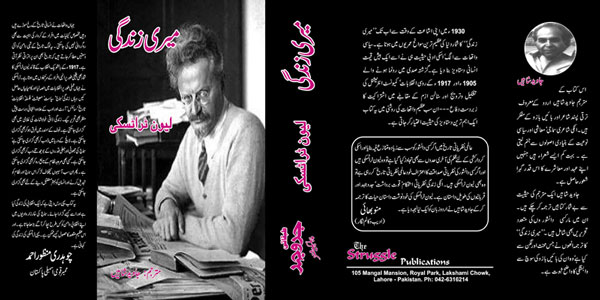We have just received an inspiring report of the congress of The Struggle which was the largest congress of any Marxist, communist, or left party ever held in Pakistan. Esteban Volkov (Trotsky's grandson) was present, who also attended the launching of the Urdu language edition of Trotsky's My Life. In addition there is a report on the March 20 antiwar demonstration in Lahore, and the commemoration of Bhagat Singh, a fighter for independence hanged by the British imperialists in 1924.
We have just received an inspiring report of the congress of “The Struggle” which was the largest congress of any Marxist, communist, or left party ever held in Pakistan.
On Sunday, March 21, in the Alhambra Hall No. 1 in the centre of Lahore, 1107 workers, trade unionists, peasants and youth gathered for the annual national congress of The Struggle, the Pakistan Marxist organization, which has grown rapidly in recent years and is now completely dominant on the Left in Pakistan. There were delegates from all over Pakistan – all four provinces were represented – Punjab, Baluchistan, Sindh and the North West Frontier Provinces – as well as a strong delegation (146) from Kashmir.
 |
|
The variety of the delegations was evidenced in a colourful array of national dress and headwear, but irrespective of differences of language and dress, all were united in their enthusiasm and revolutionary spirit. A very important element here was the presence of a large number of women – more than 200. Despite the almost insurmountable barriers placed in the way of any woman who wishes to be politically active in this country, the crisis of capitalism and the appalling conditions of the masses have acted as a spur to a growing number of Pakistani women and girls to participate in revolutionary politics. The Struggle organization has always stressed the need for work among women and this persistent work has yielded excellent results.
The platform was impressively decorated with huge portraits of Marx, Engels, Lenin and Trotsky, with red banners containing quotations from the great teachers in Urdu. A prominent place was occupied by pictures of Trotsky, owing to the presence of Esteban Volkov, Trotsky’s grandson, who has come to Pakistan to launch the first Urdu translation of Trotsky’s My Life.
Comrade Volkov opened the congress with a brief speech, which started with the following words: “More than 150 years ago, Marx and Engels wrote the Communist Manifesto. The capitalists have attempted ever since to bury Marxism in the graveyard of history, but the ideas of Marxism today are more alive and vigorous than ever. And this will be so as long as exploitation and oppression exist on earth.”
He went on to stress the role of Leon Trotsky: “The contribution of Leon Trotsky to this arsenal is invaluable and absolutely relevant,” he said.
Comrade Volkov ended his speech with the words: “I am filled with joy and emotion at being here and witnessing the opening of this congress of The Struggle organization in Lahore, with the revolutionary Marxists of Pakistan who are fully conscious of the great value and complete correctness of the ideas and struggle of Leon Trotsky. Today all genuine revolutionary Marxists clearly understand that Trotsky is the continuator of Marx, Engels and Lenin. Comrades, go forward! The inspiration and example of the revolutionary Leon Trotsky is imperishable and inexhaustible!”
 |
|
Comrade Alan Woods, editor of Marxist.com and Socialist Appeal, introduced the first session on world perspectives. He explained the general instability as a manifestation of the crisis of capitalism on a world scale. He explained at some length the great significance of the recent events in Spain as a concrete indication of the general world turbulence. “Dialectics tells us that things change into their opposite. In these conditions sudden and sharp changes are rooted in the situation. We must be prepared.”
The mood of the delegates in all sessions was electric. The discipline was impressive and the degree of organization impressive. Most were youth – the average age of the delegates was 22 – although there was a sprinkling of older experienced comrades. In this congress there were students from all the universities, medical and engineering colleges and youth organizations in Pakistan. But the big majority were workers.
Among trade unions represented were Pakistan International Airways, Pakistan Railways, National Highway Workers Union, Pakistan Telecommunication Workers Union, Water and Power Development Authorities Union, Pakistan Steel Mill, Karachi Port Trust, Paramedical Association, Town Development Authorities Union, Transport Union, Sugar Workers Union, Cement Workers Union. The President of the biggest union represented the Bank Workers. Also Postal workers, port workers, journalists etc.
Three members of parliament were among those present and even one district governor, Nazar Gondal, of the PPP, the only one who resisted the pressures of the Musharraf regime to defect in all Punjab. He said “There was a time when nobody spoke of socialism, and many of us who fought in the revolution of 1968-9 began to think that all was lost. But now I have attended this congress, I am filled with new courage and enthusiasm. Even in the darkest days, The Struggle alone maintained the faith in socialism. In the most difficult conditions, it is incredible that such forces of revolutionary socialism have been built in Pakistan.”
Comrade Lal Khan, editor of the Asian Marxist Review, introduced Pakistan Perspectives, emphasizing the deep crisis of Pakistan capitalism and the reactionary and corrupt nature of the bourgeoisie. He told the delegates: “Corruption is the basis on which the Pakistan economy is running. This shows that the claims of the ruling class that they wish to uproot corruption is a farce: if they uproot corruption they uproot themselves.”
This discussion took place at a time when US imperialism is intensifying its pressure on Pakistan to launch an offensive in the tribal areas on the borders of Afghanistan, in the hope of eradicating Al Qaeda and capture or kill bin Laden. The Pakistan army has met with stiff resistance and taken heavy losses in this campaign, which has been characterized by heavy bombing of villages and numerous civilian casualties with little to show for it. Lal Khan commented ironically:
“The regime has announced a cease fire. This is a confession of defeat. The imperialist aggression in Afghanistan means that the war has spread to Pakistan. The massive flood of heroin has also increased all the contradictions within the state.”
The Marxist MP Manzoor Ahmad, who was able to point to remarkable gains on all fronts, presented the organizational report. “This is only the beginning”, he said. “We must step up the work in all fields – workers, peasants, students and women, and we will build a strong socialist revolutionary organization that can lead the whole subcontinent to the socialist revolution and build the Socialist Federation of the Subcontinent as the first step in the world revolution.”
All, the votes on organizational questions were unanimous, and a new central committee was elected.
There were a significant number of foreign delegates and visitors from India, Iran, Sri Lanka, Denmark, Britain, Mexico and Belgium. The congress was closed by comrade Alan Woods, who once again underlined the example of personal sacrifice of that great martyr of the proletariat Leon Trotsky and urged the delegates to carry the message of the congress to every factory and village and every school and college.
After unanimously approving a resolution in solidarity with the Venezuelan revolution, the congress closed with the singing of the Internationale.
Pakistan Marxists take to the streets
In and around the congress, there were a series of important public activities.
On Saturday March 20th the international day of action against the occupation of Iraq was marked in Lahore by a militant demonstration of 1,500 people. The noisy demonstration marched through the centre of the city, chanting revolutionary slogans, such as “Socialist revolution!” “Down with Bush!” “Bread, Clothes and Houses!” and “Throw imperialism out of Iraq!” The march halted at Bhati Chowk, the most crowded part of the city centre, where the demonstrators sat down in the middle of the road, chanting slogans.
Although formally called by the Pakistan Social Forum, in practice the demonstration was organized and led by The Struggle, the Pakistan Trade Union Defence Campaign and Youth for International Socialism (Pakistan), who invited Alan woods to march at the head of the demonstration. Most of the Red flags, banners and placards in the demonstration were from YFIS. The crowd was addressed by Manzoor and Qamar Kaira, both Members of the National Assembly.
On Tuesday, March 23, at the Flatti hotel with three hundred people present Esteban Volkov presented the Urdu language edition of Trotsky’s My Life. This was indeed a historic occasion. This was the first major book by Trotsky that has been translated into Urdu and it seems to be the first major book of Trotsky in any of the languages of the subcontinent, except Sinhala.
Esteban Volkov gave an emotional speech in which he graphically described the last period of Trotsky’s life in Mexico. Despite the heat, in the crowded hall inside, the audience followed the dramatic account in enthralled silence. At the end, visibly moved, they gave comrade Volkov a standing ovation.
Bhagat Singh Rally
Immediately after the book ceremony, the comrades proceeded to stage a Rally on the occasion of the anniversary of the execution of Bhagat Singh, the legendary revolutionary fighter for independence, who was hanged by the British imperialists 73 years ago in Lahore.
Two busloads of demonstrators waving red flags and flanked by motorbikes also waving red flags made their way through the crowded streets of Lahore to the place where Bhagat Singh was executed. About one kilometre from this place, the demonstrators got off the buses and marched, waving a sea of red flags and chanting slogans such as “Long Live Bhagat Singh”, “ Asia is Red”, “ Long Live Socialist Revolution”, “ Down With American imperialism”.
At the graveside of Bhagat Singh – a simple stone – the three hundred or so demonstrators halted in silence as a wreath of fresh roses was placed on the tomb by a delegation made up of the nephew of Bhagat Singh, Koran Jet Singh, - who had come from India to attend both this ceremony and the congress of The Struggle - Manzoor Ahmed, Esteban Volkov, and Alan Woods. In today’s newspapers reports of this demonstration were carried on the front pages.
March 23, 2004
See the photos of the congress, the book launch, and the demonstrations here.
